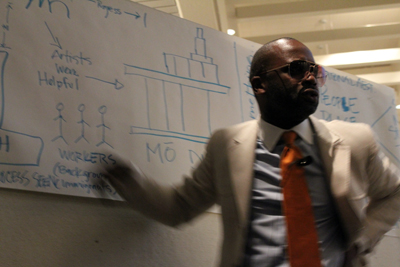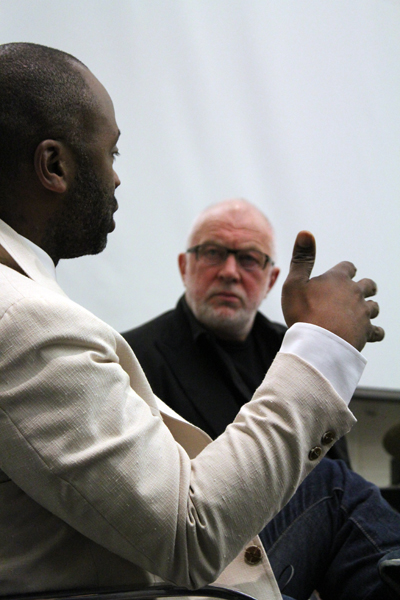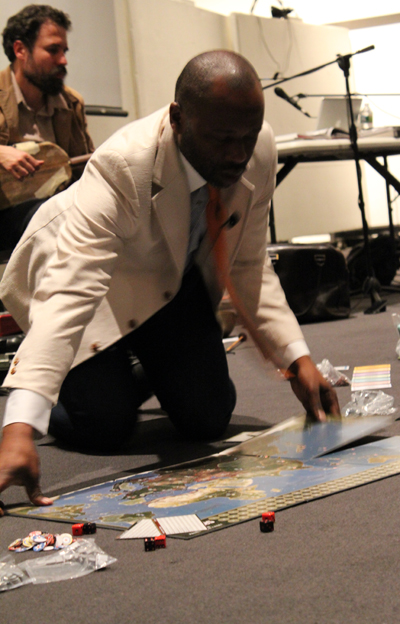
Hello Archinect!
The greatest thing just happened at the GSD.
My day so far has been: counting square feet of programmed space in my building, constructing a spreadsheet and making charts in excel, being given way too much information about the various algorithms that V-Ray uses for rendering light bounces, and...looking helplessly on as my little laptop (a MacBook from 2007) seized up from simply having 3ds Max 2011 open, with a single box drawn and one window of settings open.
I jokingly describe my MacBook as "powered by hope," because on November 4, 2008, sitting in Philadelphia watching Barack Obama on television giving his acceptance speech, I put an leftover campaign sticker over the apple symbol on its case such that when the computer is on, his face lights up.
However, 3ds Max 2011 has been brought into this world in order to tell me, in no uncertain terms, that hope is not enough.
Not nearly enough.
Despair!
I should add that all of the things described above (except the crashing computer) are necessary and important and useful and I am glad to be learning them and all, but together it did add up to a long day of soul-draining tasks.
Then comes Theaster Gates, an artist based out of Chicago and one of this year's GSD Loeb Fellows, who staged a "performance-talk" called Sermons on the City. There was music, with bassist Josh Abrams, drummer Michael Avery, and percussionist Lisa Alvarado--and Theaster himself, who has an incredible voice and has obviously spent much time singing (and writing, I'm guessing) gospel in black churches.
It was both highly staged and improvised, and involved a chart describing how artists have been useful for architects and architecture and the city over the course of modernism, as well as some board games--Monopoly and something that looked like Risk--standing in for the way that developers play with our cities and lives. All brought together by the song of Theaster's sermon and prayer for our cities.
[The role of artists in architectural modernism.]
There were many beautiful lines, but just a few that I managed to tap out on my iPhone (and remember, you need to imagine these sung, not spoken):
"The problem is that from the beginning of [the profession of] planning we've been preoccupied with the grand plan and less occupied with people. All those people."
"This is my planner's prayer. If we could change the planners game. If we could. Affordable housing. If we didn't need so many $100 bills. If we didn't have to move all the black people to the outside."
"Arrogant ambitious asshole architects are always arguing for more marble, more hundred dollar bills, more. And I love that arrogance. But I want to see it arguing for something for the good."
[Theaster is singing: and the rich people build themselves a gated community over here.]
Then there was Michael Hays, the official respondent. How was he going to respond to a "talk" that featured Kanye shades, a strong bassline, and the scattering of board game pieces?
Well, Michael did what he does: he's the hired brains of the school who can, like that Hair Guy, theorize anything. So when Theaster sung (yes, sung) to him, "Brother Michael, if you could take your place at the podium," the man took his place at the podium and talked about Deluze and flow and how "when Josh puts his fingers to the bass strings he becomes a Bass Machine, when George puts the game pieces in play he becomes a Game Machine, and when Theaster dons the Kanye glasses and silk scarf he turns a preaching machine into a Superfly Machine. And all of this is the Theaster Gates Curiosity Machine, a kind of body without organs." etc.
Then they started rapping. Michael would give two words ("books, bodies," or "art, identity politics") and Theaster would respond lyrically (but in speech, not song, at least until the very end), drawing from theory, from his own life, and from his wide-ranging experience in the worlds of art, academia, architecture, planning, development, and activism.
It was incredibly moving, not least because it's so rare and so difficult for a person to speak openly and publicly about their own self and work within the wider arenas in which they find themselves, addressing real frustrations (e.g. "Often I think I'm invited to do things at a museum because they're after who they think I represent; they might have patrons who would pay if they have an African American male straight artist at that moment, because that's fundable. There was a point in time when I would have said 'fuck them.' And another when I would have said, 'I need the money, I don't care why they're asking me, I'll take it and I'll just bring what I'm going to bring.' And then at another time, you start to think it's OK to be black and be at Harvard and to talk the way you do"), all in a way that isn't ultimately angry or self-indulgent, that opens up the conversation rather than closing it down.
Within this exchange, a few more things from Theaster: "What I want for us is a healthy city, a vibrant city, where people are different." And, about dealing with developers, who have the power and money that so often really moves things in cities: "For that developer who's coming in [with their eye on nothing but the bottom line, with no experience in life of the kind of people or places that he's either displacing or building for], I want to have enough compassion for that jerk that I can suspend my own judgment long enough to see things through his eyes in order to engage him and see how his skill set can be put to use."
Amen.
There were also questions from the audience. One was from my classmate Quardean Lewis-Allen, who asked about the role of institutions in social activism. The response really spoke to me. Theaster mentioned a friend of his that he spoke with on the phone this morning; this friend is in the third year of an M.Arch. program in North Carolina and she is frustrated because she wants to do outreach and work with communities and doesn't know how. "She wants the institution to give her passion but her institution can't do that. It's not the institution's job. It's job is to give you the skill set."
And he talked about how we invest a lot in algorithms and [formal blah blah blah] in academia and that's fine, but we have to bring our own passion and values. "I'm afraid of classes that are like ten steps to this or that. And the Kennedy School has been having this exact debate: can we teach people to become social entrepreneurs? I don't think I could explain the how of that to you, but I can model, demonstrate, impart that enthusiasm. I'm hoping that what I can do is impart the courage and enthusiasm for you to ask these questions."
It was not something that happens here every day. And its value for me was not only in the message itself, but in how it contextualizes the rest of my education here. I'm reminded of a conversation my Gravity's Rainbow class had last night with our professor, Peter Galison: we felt that the epiphanic moments in that novel--moments of simplicity, and a kind of love or ethical clarity--could not have worked if they were not set in such stark contrast to the perverse, often repellent, knotted tangles that form the rest of the text. To have a clearing, you need to have the woods, and each allows the other to function.
And I think that Theaster's message wouldn't have worked--or it would have had an entirely different function--if it entered into an institution that imposed its values on its students, or where the social agenda was always up front. Because it's not at the GSD. This place is an open playground (or a gulag, if you prefer) where we learn, we test ideas, we push ourselves and each other in many ways. It is, at least in the context of the M.Arch.I program, a place that is in the business of giving us the skills to be bad-ass architects. And yes, those skills include knowing how to optimize square footages and how to render.
And because going through this training is precisely what will allow many of us to eventually assume certain positions in the world--because we ARE (or will be) that asshole developer Theaster is talking about--his message was powerful. It was a reminder that we're getting our skills and the credentials from this place, but we have to bring our own game.
Lian
This blog was most active from 2009-2013. Writing about my experiences and life at Harvard GSD started out as a way for me to process my experiences as an M.Arch.I student, and evolved into a record of the intellectual and cultural life of the Cambridge architecture (and to a lesser extent, design/technology) community, through live-blogs. These days, I work as a data storyteller (and blogger at Littldata.com) in San Francisco, and still post here once in a while.



5 Comments
this sounds awesome/awful
He really can sing. Would have been awful if he couldn't, but this received a more enthusiastic reception at the GSD than any other event that I've been to.
Sounds like a perfect portrayal of the extreme balances offered by, and to be expected from, the GSD!
Thanks for sharing, Lian!
Thanks, Mezzanotte!
To me this was amazing as well, and involved enlarging the conversation we have among ourselves, from the 9 year old who came up and played board games for a while, to talking to the old dead architects in some library books. Michael Hays was great too, posing the two words that showed the large conversation in other ways.
This whole thing should open the floor for all of us to talk about anything we think needs to be talked about.
Block this user
Are you sure you want to block this user and hide all related comments throughout the site?
Archinect
This is your first comment on Archinect. Your comment will be visible once approved.